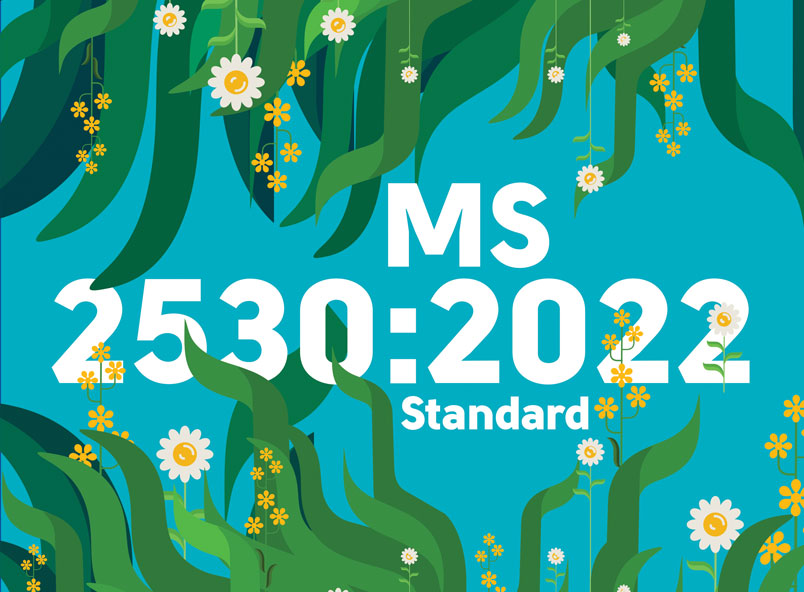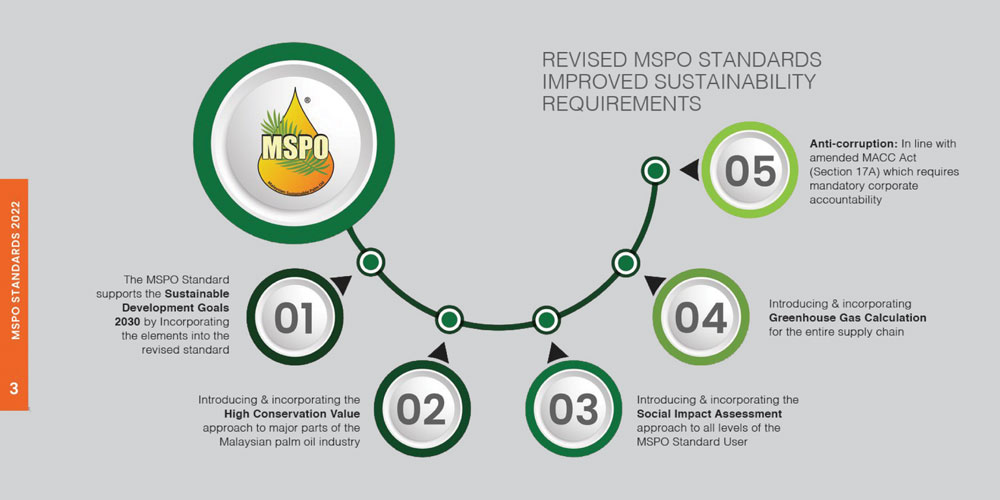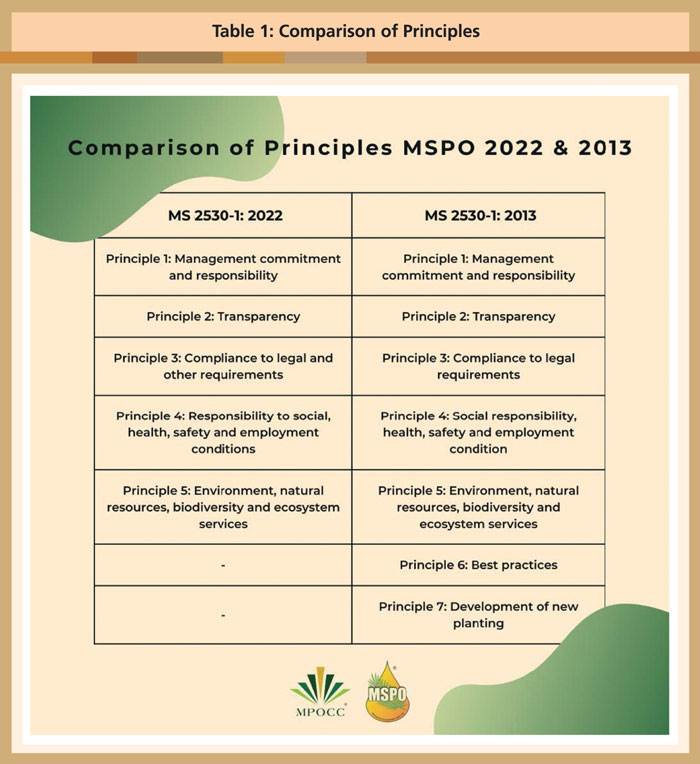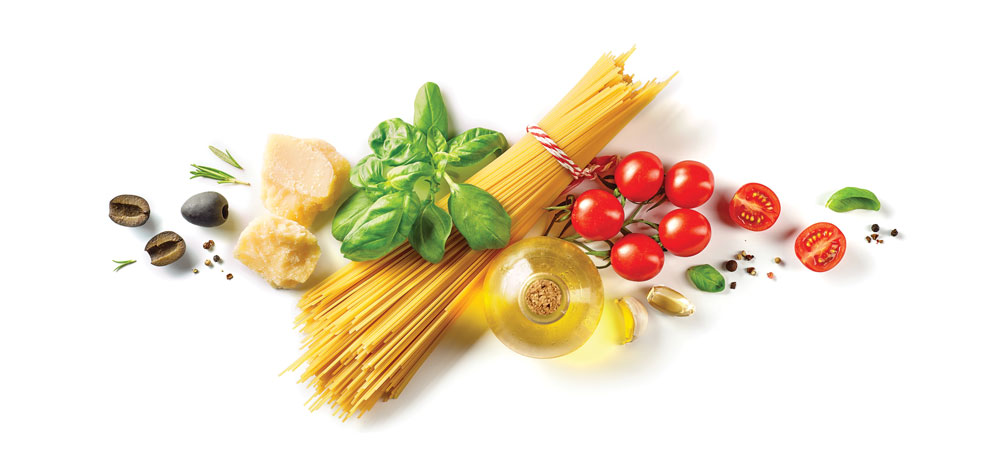



Changes in MSPO certification
August, 2022 in Issue 2 - 2022, Sustainability
Compared to its predecessor, the MS 2530:2022 standard was developed with a very different industry baseline knowledge on sustainable oil palm management practices. In 2013, sustainable certification of oil palm was only implemented by large industry players.
Based on groundwork established by the MS 2530:2013 standard, revised Malaysian Sustainable Palm Oil (MSPO) standards were launched in March 2022 with more awareness about sustainable practices and the capacity to implement them, which was not previously present.
The MS 2530:2022 standard retains the four main parts, but is further divided into eight separate parts. This is to cater to differences in capacity and scale of the implementers of the MSPO.

Scope of the MS 2530:2022 standard
MS 2530-1:2022 – MSPO Part 1: General Principles
Part 1 lists the general principles of the standard. It provides the framework for the other parts and includes terms and definitions used throughout the standard. Part 1 does not contain requirements used to assess conformity.
MS 2530-2-1:2022 – MSPO Part 2-1: General Principles for Independent Smallholders (less than 40.46 ha)
Part 2-1 contains requirements used to assess conformity for independent smallholders against the MSPO. Independent smallholders are categorised as individual farmers who own or lease less than 40.46 ha (100 acres) of an oil palm smallholding and manage the smallholding themselves.
MS 2530-2-2:2022 – MSPO Part 2-2: General Principles for Organised Smallholders (less than 40.46 ha)
Part 2-2 contains requirements used to assess conformity for organised smallholders against the MSPO. This refers to individual farmers who own or lease less than 40.46 ha of an oil palm smallholding, and the holdings are managed by government agencies such as FELDA, RISDA, FELCRA, SALCRA and SLDB.
MS 2530-3-1:2022 – MSPO Part 3-1: General Principles for Oil Palm Plantations (40.46 ha to 500 ha)
Part 3-1 contains requirements used to assess conformity against the MSPO for small oil palm estates between 40.46 ha and 500 ha.
MS 2530-3-2:2022 – MSPO Part 3-2: General Principles for Oil Palm Plantations (more than 500 ha)
Part 3-2 contains requirements used to assess conformity against the MSPO for large oil palm estates/plantations with areas of more than 500 ha.
MS 2530-4-1:2022 – MSPO Part 4-1: General Principles for Palm Oil Mills including Supply Chain Requirements
Part 4-1 contains requirements used to assess conformity for palm oil mills against the MSPO. This standard contains requirements for sustainable management, as well as supply chain requirements.
MS 2530-4-2:2022 – MSPO Part 4-2: General Principles for Palm Oil Processing Facilities including Supply Chain Requirements
Part 4-2 contains requirements used to assess conformity for palm oil processing facilities – such as for crude palm oil and palm kernel – against the MSPO. This standard contains requirements for supply chain requirements, as well as introduces requirements for sustainable management practices.
MS 2530-4-3:2022 – MSPO Part 4-3: General Principles for Dealers including Supply Chain Requirements
Part 4-3 contains requirements used to assess conformity for fresh fruit bunch dealers and palm oil traders against the MSPO. The category includes all types of dealers under MPOB licensing, including exporters and importers that purchase and sell oil palm products without changing the chemical properties of the materials. This standard contains requirements for sustainable management, as well as supply chain requirements.
The new framework for MSPO Standards has only five principles compared to the previous version of seven principles (Table 1). This was decided by the Technical Committee on MSPO to further streamline the requirements to be consistent with the overall flow.

Principles 1-5 are very similar between the MS 2530:2013 and the MS 2530:2022 standards. Principle 6 of MSPO 2013 has been amalgamated into Principles 1, 2, 4 and 5. The requirements for new plantings have been strengthened and incorporated mainly into Principle 1, with supporting requirements appearing in Principle 4 and Principle 5.
Cheah Chi Ern
Systems Management Manager
Malaysian Palm Oil Certification Council
